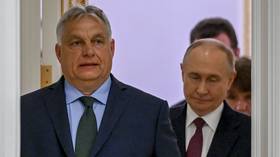Palestinian statehood bid fails at UN Security Council as US, Australia vote against

The UN Security Council has failed to adopt the Arab coalition’s bid calling for the creation of a Palestinian state and an end to Israeli “occupation”. The veto power US and Australia voted against the move with 5 abstentions.
The draft resolution gathered only 8 votes in favour, so it was automatically defeated. The US however still used its veto power and voted against the resolution. Another veto power state, the UK, along with Lithuania, Nigeria, Korea and Rwanda have abstained from the vote.
Security Council draft resolution on Palestinian question not adopted. Vote: 8 in favour; 2 (USA, AUS) against; 5 abstentions
— United Nations (@UN) December 30, 2014
"This resolution sets the stage for more division, not for compromise," said US Ambassador Samantha Power, calling the draft a “staged confrontation.”
“The United kingdom supports much of the content of the draft resolution. It is therefore with deep regret that we abstained from it,” said UK ambassador to the UN, Mark Lyall Grant. “We are disappointed that the normal and necessary negotiation did not take place on this occasion.”
However, Russia’s UN envoy Vitaly Churkin said that Moscow “cannot share the objections of those who believe that the draft resolution was undermining the prospects of the negotiating process.”
“Unfortunately last year revealed how this process has gone into a blind alley, with its monopolization by the United States and their pullback from the Quartet [US, EU, UN and Russia]. We believe this to be a strategic mistake,” said Churkin.
“This draft reflects just demands of Arab states, including the Palestinian people, and is in accord with the relevant UN resolutions, the ‘land for peace’ principle, the Arab peace initiative and middle-Eastern peace roadmap. And is also in accord with China’s consistent position. We express deep regret over the failure of the draft resolution to be adopted,” said Liu Jieyi, China’s permanent representative to the United Nations.
Israeli authorities said they are "satisfied" with the failure of the Palestinian statehood bid at UN Security Council.
An official bid for statehood was submitted to the Council Tuesday by a Jordan-led Arab coalition. The bid featured a revised draft resolution of a similar proposal submitted earlier this month. Delegates voted on the measure Tuesday afternoon.
Highly opposed by the US and Israel, the first version of the draft resolution was submitted “in blue” to the UN Security Council last Wednesday. The Council includes five permanent members who hold veto power and ten additional members who serve two-year terms.
The resolution gives 12 months for a “just, lasting and comprehensive peaceful solution” to the Israeli-Palestinian conflict, which it regards as the creation of a “sovereign and viable” Palestinian state based on 1967 borders, as well as the withdrawal of all Israeli forces from the occupied territory by 2017.
Its text had already seen several amendments that concern East Jerusalem as capital of the future state of Palestine, Israeli settlement building, and Palestinian refugees’ right of return, Palestinian Liberation Organization (PLO) Executive Committee member Abu Yousef told Asharq Al-Awsat newspaper.
According to the current draft, Jerusalem is regarded as the capital of both Israel and Palestine, but the role of East Jerusalem in a future Palestinian state is not specified. “International legitimacy is our ceiling on this issue, and we cannot drop below this ceiling,” Yousef told the paper.
“I think there is very little doubt that any resolution in the Security Council that actually created a Palestinian state or called for real statehood would be vetoed,” US activist and journalist Phyllis Bennis told RT. “I think there is a big question whether the drafts that are now circulating actually do that. The French amendments in particular significantly weaken the idea that this is something that would actually create the Palestinian state.”
Bennis explained that “there is no consequence named. The resolution is not taken under either Chapter 6 or Chapter 7, which are the coercive chapters of the UN charter.” These chapters imply the use of military force and putting pressure against the state, such as sanctions.
Palestinian President Mahmoud Abbas said on Tuesday his administration would"no longer deal"with Israel in case of the resolution's failure. "If the Arab-Palestinian initiative submitted to the Security Council to put an end to [Israeli] occupation doesn't pass, we will be forced to take the necessary political and legal decisions," the Algerian APS news agency quoted Abbas as saying.
Last Thursday, Israeli Foreign Minister Avigdor Lieberman called a UN bid for Palestinian statehood an “act of aggression.”
“Palestinian President Mahmoud Abbas is adopting measures whose sole aim is to attack Israel, with no benefit for the Palestinians,” Lieberman said in a statement.
This summer, tensions in Jerusalem and the West Bank escalated, leading to the 50-day conflict between the Israel Defense Forces and Palestinians. Operation Protective Edge claimed over 2,200 lives – most of them Gaza civilians.












